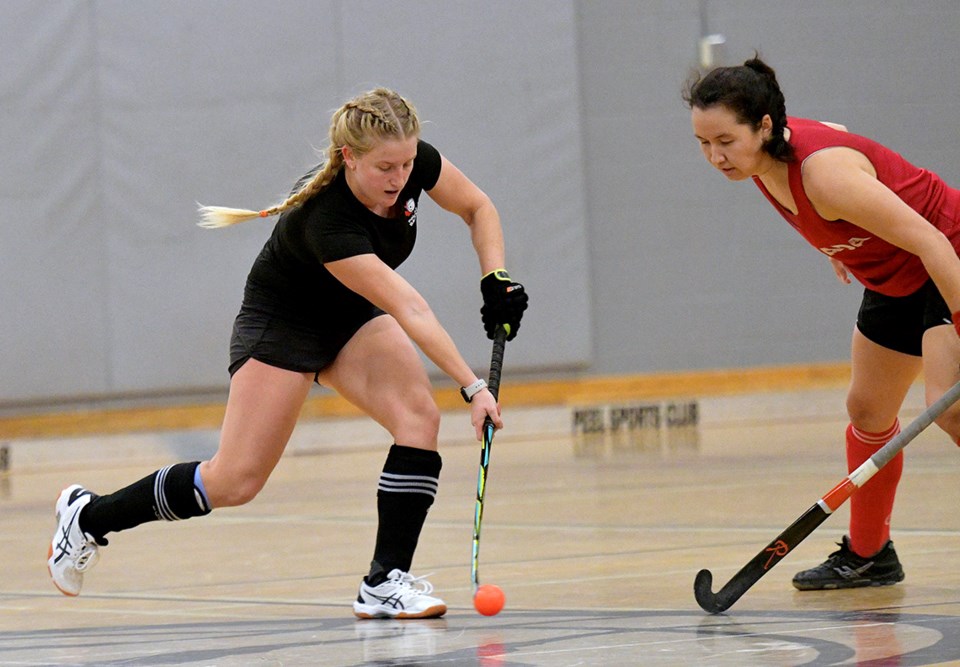A trip to Austria could go a long way in determining if a young Coquitlam woman makes Canada’s national team in a sport most people likely haven’t heard much about.
Natalie Winter is in Vienna for the Rohrmax Cup indoor field hockey tournament.
She’s part of a select group vying for the chance to wear the red Maple Leaf at the sport’s World Cup that will be contested in Pretoria, South Africa, from Feb. 4–11.
Winter, an accomplished field hockey player with the Tri-City Eagles club program, as well as at Dr. Charles Best Secondary School in Coquitlam, had only limited experience with the indoor version of the sport before she headed east four years ago to join the York University Lions, as the outdoor season is generally able to run through the winter months in B.C.
But with her coach at York, Zeeshan Minhas, also running an indoor club during the cold months, Winter saw an opportunity to stay fit through the off-season as well as further develop her skills.
“When I play indoor, there is less time to think when I have the ball, so I am forced to use my instincts instead of consciously making a decision,” she said.
Unlike field hockey, which is played with 11 players aside on an expansive turf pitch about the same dimensions as a soccer field, the indoor game is played in a gym with six players on each team. Low boards surround the wood or linoleum floor to keep the ball in play and also provide opportunities for banking passes to teammates.
There are also differences in the rules: Players can’t lift, sweep or whack the ball in the indoor game unless they’re shooting on net and a proportionately larger penalty circle at each end means more fouls occur that result in penalty corners and strokes.
Winter said that changes the way players move the ball and defend as they stay low to the ground to push the ball forward and check opponents with their sticks laid flat.
She said her adjustment to indoor field hockey’s faster pace and confined space were helped by her experience playing box lacrosse in the Coquitlam Adanacs’ minor program when she was younger.
Indoor field hockey is largely played in countries with cooler climates where year-round outdoor play isn’t always possible.
It was developed in Germany in the 1950s and came under the governance of the International Hockey Federation in 1968.
The sport’s first World Cup was held in 2003 and it’s been contested roughly every four years since, although last year’s tournament in Belgium was cancelled due to the COVID-19 pandemic.
The participation of Canada’s women’s team in South Africa will be its third; it finished ninth in Austria in 2007 and 10th in Germany in 2015.
Winter said her journey to trying to make this year’s squad started when her dad spotted a post on Facebook inviting players to an open tryout that involved four sessions of drills and scrimmages over the course of a weekend.
Most of the women who attended had been recommended by other coaches or had previous experience with the national indoor or outdoor teams.
Winter survived the initial cut to about 30 athletes who’ve since been divided into four teams to compete at various tournaments prior to the final selection of the roster heading to Pretoria.
The Rohrmax Cup is one of indoor field hockey’s premier tournaments, attracting top men’s and women’s national and U21 sides, as well as elite club teams like HC Rotweiss Wettingen from Switzerland.
To prepare, Winter’s side has been practising three to five times a week as well as competing in local tournaments, sometimes against male teams.
“The goal of the Austria tour is to gain knowledge and experience from a skilful European style of play,” she said, adding the Rohrmax tournament will be the highlight of her field hockey career.
At least so far.
• Canada's indoor field hockey program is self-financing, meaning athletes have to pay their own way to get to South Africa. The team is currently running a fundraiser in conjunction with Freestyle Fitness in Coquitlam through the sale of Outway technical socks; $10 of every pair of socks sold goes to the women's field indoor field hockey team. To learn more, email [email protected].





